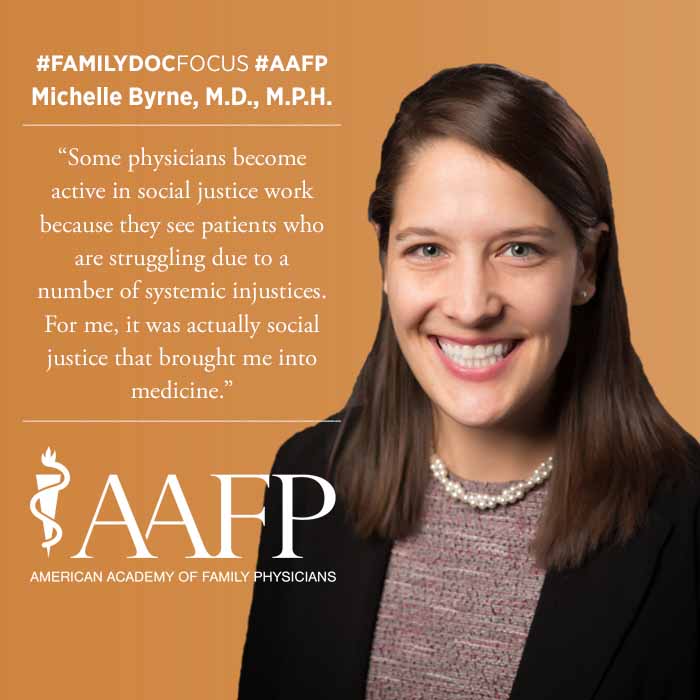Social Justice Brought Resident Leader to Family Medicine
September 16, 2019 12:03 pm David Mitchell – Michelle Byrne, M.D., M.P.H., knew she wanted to change the world; she just wasn't sure how she was going to do it.
At 22, Byrne had earned an undergraduate degree with honors from Notre Dame along with a lengthy list of grants, scholarships and awards. She had already served one internship in Congress and was following that up with another at the White House.
The question was, what next?
"I always loved science and health, but I thought I would spend my career working in policy," she said. "I knew I would end up going back to school, but I wasn't sure for what."
Byrne pondered her options while spending time volunteering in Honduras, teaching math, science and English to elementary school students. She returned home to Kansas City and landed a job as the manager of a new pediatric practice, where she had the opportunity to create policies, procedures and workflows from scratch. She also managed hiring, payroll, benefits, budgets and more.
Byrne, 32, said she loved the job, but after two years of working with pediatricians, she realized she wanted more.
"I was missing the patient-physician interaction and the amazing relationships they had with people," she said. "I wanted to see patients myself."
Byrne also saw in medicine a platform to do what she wanted most -- to make a difference.
"Some physicians become active in social justice work because they see patients who are struggling due to a number of systemic injustices," she said. "For me, it was actually social justice that brought me into medicine."
At the Loyola University Chicago Stritch School of Medicine, Byrne participated in global health programs in Guatemala and Bolivia, and led the student board of a community health clinic. As a fourth-year student, she was a live-in volunteer at a Chicago shelter for migrant women and children.
"Living in the Su Casa community taught me more about being a doctor than medical school," she said. "It's really different to see patients for 20 minutes in an office visit than it is to live with people who are often excluded in our society and walk that journey with them. Accompanying the Su Casa families really broadened my understanding of the difficulties patients face and the gaps in our health care system."
Byrne initially intended to train in pediatrics, but medical school rotations showed her that she enjoyed caring for patients of all ages. She also realized family medicine was a better fit for her because it was the specialty that "seemed to have the most people interested in making an impact on the social justice issues I care about."
At the Northwestern McGaw Family Medicine Residency, Byrne chairs the task force that developed a social justice curriculum for the program. She also has served on the AAFP's Commission on Membership and Member Services and is wrapping up her term as the resident member of the Academy's Board of Directors. She advocated for student and resident representation on the FamMedPAC Board of Directors through the National Congress of Family Medicine Residents and is currently serving as interim director in that new position.
Byrne will be one of 12 residents honored Sept. 26 with the Award for Excellence in Graduate Medical Education during the Family Medicine Experience in Philadelphia. She said she hopes to practice broad-scope family medicine -- and help train students and residents -- in an urban underserved area after she graduates next year.
To learn how you can make a difference at the national level, check out the AAFP's leadership opportunities for medical students and residents.
